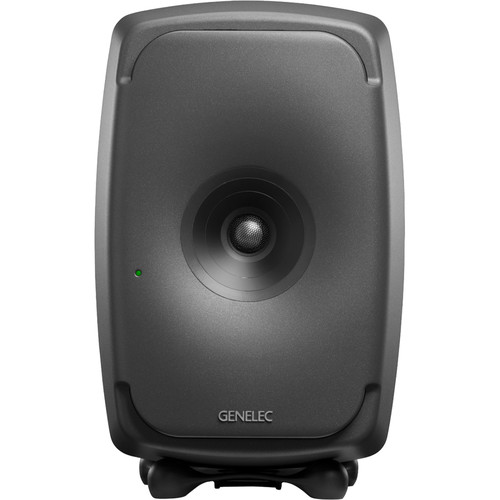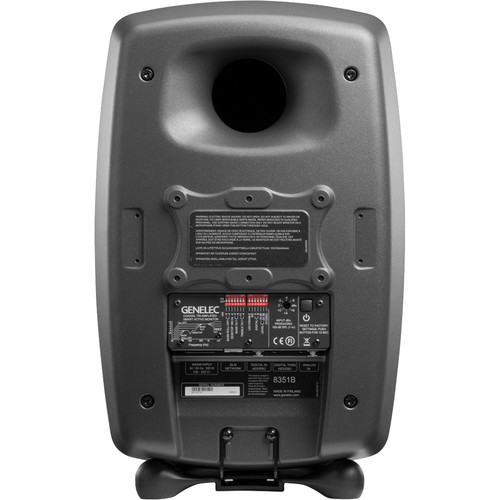Styled in a finish dubbed producer by the manufacturers, the Genelec 8351B is a point-source, near-field monitor for pro-audio applications. It features a coaxial design, which houses its midrange driver, treble tweeter, and dual 8.6 ? woofers in one enclosure, thereby aligning their acoustical axes and ensuring an accurate point of sonic radiation. The monitor can accept both analog and digital AES/EBU signals from separate XLR jacks, and uses Intelligent Signal Sensing technology (ISS) to detect automatically if audio is being fed into the monitor to save energy when no signal is present. This monitor provides a frequency response of 38 Hz to 20 kHz (A±1.5 dB), at a maximum SPL of 113 dB at 1m.
To coordinate multiple 8351Bs, you can make use of Genelec s GLM software to tune your monitor to your room, facilitate and coordinate daisy-chaining monitors, override the ISS function, and more. Routing is accomplished by means of a few Cat5 (RJ45) cables and a GLM adapter. You ll note that two RJ45s are provided for GLM connectivity. An XLR output jack is also on hand for sending identical copies of incoming AES/EBU signals to other monitors.
DIP switches and a rotary control for level are offered on the rear of the monitor for offline use. Use these switches to tune the monitors to your room without DSP if needed. An Iso-Pod stand is included to facilitate isolation from aurally deleterious surfaces. Other assets, such as the 8351B s acoustically concealed woofers, minimum diffraction coaxial construction, and a proprietary waveguide, are further expounded upon in the features section.
Genelec Loudspeaker Manager (GLM) Compatible
GLM, a proprietary software available free from Genelec, allows you to coordinate, equalize, and otherwise manage your 8351B to its fullest potential.
Analog or AES/EBU
The 8351B s audio inputs are designed to integrate easily into all professional environments, supporting balanced, line-level analog and AES/EBU-format digital signals. Analog input is selected when the AES/EBU signal input is not connected. The AES/EBU-format digital audio input is selected automatically when a valid digital audio signal is present. Automatic audio signal input selection can be overridden, however, when the 8351B is controlled by a GLM network, enabling flexible selection of either input. On the output side, an XLR connector passes through an unaltered copy of the incoming AES/EBU signal, enabling daisy-chaining of up to four monitors. The proper digital channel can be selected using DIP switches, or via GLM.
Minimum-Diffraction Coaxial Driver (MDC)
The minimum-diffraction coaxial driver is comprised of a powerful midrange element combined with a tweeter that extends to ultrasonic frequencies. This arrangement minimizes or downright eliminates acoustic the diffraction sources typically found in coaxial drivers, engendering a flat frequency response both on the acoustical axis and at all off-axis points of listening. The 8351B may be oriented either horizontally or vertically, and is intended for near-field listening where the influences of the room can be minimized as much as possible. Typical distances can vary from approximately three to ten feet, depending on room size and SPL requirements.
Directivity Control Waveguide (DCW)
The 8351B has an uncharacteristically large directivity-control waveguide extending over the whole front face of the enclosure. The midrange driver cone also forms a part of the directivity-control waveguide for the tweeter. From behind the waveguide, two woofers radiate audio through two openings in the enclosure front. This design enables directivity control of all audio frequencies down to the low bass frequencies.
Smart Active Monitor (SAM)
SAM technology can improve the reliability and accuracy of these monitors, providing several parametric notch and shelving filters that can be tuned automatically in concert with GLM software, thus compensating for colorations generated by room acoustics. This enables SAM monitors to sound neutral and achieve accurate imaging in most acoustical environments.
Genelec 8351B SAM Specs
| Monitor Type & Configuration | Active 3-Way |
| Number of Included Monitors | Single Monitor |
| Enclosure | Bass-Reflex/Ported, Shielded |
| Total Power Output | 550 W |
Drivers
| Tweeter | 1 x 1" / 25.4 mm Metal Dome |
| Midrange | 1 x 5" / 12.7 cm Cone |
| Woofer | 2 x 8.63" / 21.92 cm Oval Cone |
| Amplifiers | HF: 1 x 150 W MF: 1 x 150 W LF: 1 x 250 W |
Performance
| Frequency Range | 32 Hz to 43 kHz (-6 dB) |
| Frequency Response | 38 Hz to 20 kHz ± 1.5 dB |
| Maximum Sound Pressure Level (SPL) | 118 dB |
| Total Harmonic Distortion (THD) | 0.05% |
| Maximum Input Level | +25 dBu (Balanced) |
| Analog Input Sensitivity/Gain | +36 to -6 dBu (Continuously Variable) |
| Self-Generated Noise | Less Than 5 dB (at 328` / 1 m) |
| Protections and Limiting | Driver Protection |
Signal Processing
| EQ | 1 x LF Tilt: -2 to -6 dB at 800 Hz 1 x HF Tilt: 2 to -4 dB at 5 kHz 1 x Low-Mid Shelf: -4 dB at 160 Hz |
| Crossover Frequency | Low-Pass: 320 Hz High-Pass: 2.8 kHz |
| App-Based Signal Processing | GLM Software Adjustment Parametric Notch Filter Low Shelf EQ High Shelf EQ |
| Maximum Sampling Rate | 192 kHz / 24-Bit |
Connectivity
| Audio I/O | 1 x XLR 3-Pin Balanced Input (10 Kilohms) |
| Digital Audio I/O | 1 x XLR 3-Pin AES3 Input 1 x XLR 3-Pin AES3 Out/Thru |
| Network I/O | 2 x RJ45 Ethernet |
| USB | None |
| Wireless | None |
Power
| AC Input Power | 100 to 240 VAC, 50/60 Hz |
| Power Consumption | 16 W (Idle) 250 W (Maximum) |
| Color | Producer Gray |
| Dimensions (W x H x D) | 11.3 x 17 x 10.9" / 28.7 x 43.3 x 27.8 cm (Each) |
| Weight | 31.0 lb / 14.1 kg (Each) |
Packaging Info
| Package Weight | 38.205 lb |
| Box Dimensions (LxWxH) | 25.2 x 16.7 x 16.1" |
In the Box
- Genelec 8351B SAM Studio Monitor (Producer Finish)
- Mains Power Cable
- GLM Network Cable (16.4" / 5m)
- 2-Year Warranty (Extendable to 3-Years upon Registration)
No posts found



























